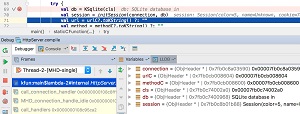News
It's Official: Kotlin Is a Hit with Android Devs
- By David Ramel
- November 3, 2017
During the first KotlinConf underway in San Francisco, Google provided an update on the programming language's use for Android development, indicating that it's been a big hit so far.
Google granted Kotlin first-class status for Android development (along with Java and C++) in May. It quickly became the new darling programming language for the mobile OS and was embraced by Google's core Android developers for their own programming.
Just over a week ago, Android Studio 3.0 was released, with the company's flagship IDE for Android development for the first time providing full built-in support for Kotlin in a stable build.
Now, more than 17 percent of the projects built with Android Studio 3.0 include Kotlin code, reported James Lau, a project manager at Google, in a blog post yesterday.
"Kotlin for Android is production-ready," Lau said. "From startups to Fortune 500 companies, developers are already using Kotlin to build their apps. Developers from Pinterest, to Expedia, to Basecamp -- and many others -- are finding their use of Kotlin is increasing productivity and their overall developer happiness levels."
Lau's update also discussed ongoing improvements to the Kotlin experience in Android Studio 3.0, noting that the new Support Library 27 added nullability annotations to that purpose, and that new guidance and samples have been published.
JetBrains, which created and open sourced Kotlin, also provided an update on Kotlin, announcing release candidate status for Kotlin 1.2 in a recap of the KotlinConf keynote.
"The new features in this release include the experimental support for multiplatform projects, allowing you to share code between modules targeting the JVM and JavaScript, as well as several language improvements, including support for array literals in annotations," said JetBrains' Dmitry Jemerov.
 [Click on image for larger view.]
Debugging Kotlin Code in CLion (source: JetBrains)
[Click on image for larger view.]
Debugging Kotlin Code in CLion (source: JetBrains)
He also announced support for creating iOS apps with Kotlin/Native and a preview version of the Kotlin/Native plugin for CLion, the company's own IDE for C/C++ coding, along with other developments.
Future work on the next release of Kotlin will focus on improving code reuse across platforms and work on compiler internals to boost performance, improve type inference, generate more efficient code across platforms and enhance the responsiveness of IDE plugins.
"We hope we'll still be able to sweeten the release with some nice new language features, but we're not making any promises at this time," Jemerov concluded.
About the Author
David Ramel is an editor and writer at Converge 360.